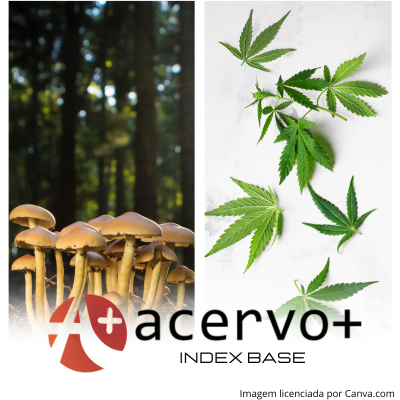Uso medicinal de psicodélicos e cannabis no tratamento de sintomas de transtornos mentais
##plugins.themes.bootstrap3.article.main##
Resumo
Objetivo: Avaliar a eficácia e segurança do uso medicinal de psicodélicos e Cannabis no tratamento de sintomas de transtornos mentais, com ênfase em seu potencial como terapias alternativas em pacientes com resistência aos tratamentos convencionais. Métodos: Revisão bibliográfica integrativa no PubMed Central (PMC), através da estratégia de pesquisa: ((Cannabis) OR (Psychedelics)) AND (Psychiatric disorders) AND (Therapeutic use). Após a busca inicial, 680 estudos foram identificados, e submetidos a critérios de seleção. Após a aplicação de critérios de inclusão e exclusão, 15 artigos foram selecionados para compor este estudo. Resultados: Analisou-se o impacto da psilocibina e do MDMA no alívio dos sintomas de depressão e TEPT, bem como os efeitos do CBD e THC no manejo de ansiedade e sintomas psicóticos, além de explorar os principais riscos e efeitos adversos associados ao uso desses tratamentos, comparando-os com as terapias convencionais. Considerações finais: O uso de substâncias psicodélicas, como a psilocibina e o MDMA, apresentam resultados positivos na prática clínica, aumentando a evidência de que quando utilizados com terapias convencionais podem trazer muitos benefícios aos pacientes. Entretanto, apresenta-se como um assunto pouco protocolado atualmente. Assim, são necessárias pesquisas contínuas, a fim de padronizar as abordagens terapêuticas para garantir a minimização de efeitos adversos.
##plugins.themes.bootstrap3.article.details##
Copyright © | Todos os direitos reservados.
A revista detém os direitos autorais exclusivos de publicação deste artigo nos termos da lei 9610/98.
Reprodução parcial
É livre o uso de partes do texto, figuras e questionário do artigo, sendo obrigatória a citação dos autores e revista.
Reprodução total
É expressamente proibida, devendo ser autorizada pela revista.
Referências
2. AICHER HD, et al. Potential therapeutic effects of an ayahuasca-inspired N,N-DMT and harmine formulation: a controlled trial in healthy subjects. Front Psychiatry, 2024; 14:1302559.
3. BINKOWSKA AA, et al. Cannabidiol usage, efficacy, and side effects: analyzing the impact of health conditions, medications, and cannabis use in a cross-sectional online pilot study. Front. Psychiatry, 2024; 15: e1356009.
4. DAMMANN I, et al. Cannabidiol and its Potential Evidence-Based Psychiatric Benefits – A Critical Review. Pharmacopsychiatry, 2024."
5. DAWSON D, et al. The prevalence of cannabis use disorders in people who use medicinal cannabis: A systematic review and meta-analysis. Drug and Alcohol Dependence, 2024; 257: e111263.
6. ECKERNÄS E, et al. Optimized infusion rates for N,N-dimethyltryptamine to achieve a target psychedelic intensity based on a modeling and simulation framework. CPT Pharmacometrics Syst Pharmacol, 2023; 12(10):1398-1410.
7. EVANS J, et al. Extended difficulties following the use of psychedelic drugs: A mixed methods study. PLoS ONE, 2023; 18(10): e0293349."
8. HAIJEN ECHM, et al. Effects of psychedelic microdosing versus conventional ADHD medication use on emotion regulation, empathy, and ADHD symptoms in adults with severe ADHD symptoms: A naturalistic prospective comparison study. European Psychiatry, 2024; 67(1):e18.
9. KORKMAZ ND, et al.Psychedelic therapy in depression and substance use disorders. European Journal of Neuroscience, 2024."
10. MALLICK K, et al. The anxiolytic effects of cannabinoids: A comprehensive review. Pharmacology, Biochemistry and Behavior, 2024; 243: e173828.
11. MASON NL, et al. Psilocybin induces acute and persisting alterations in immune status in healthy volunteers: An experimental, placebo-controlled study. Brain Behav Immun, 2023; 114:299-310.
12. MÜLLER-VAHL KR. Cannabinoids in the treatment of selected mental illnesses: practical approach and overview of the literature. Pharmacopsychiatry, 2024; 57: 104-114
13. PEREZ N, et al. Psilocybin-assisted therapy for depression: A systematic review and dose-response meta-analysis of human studies. European Neuropsychopharmacology 76, 2023; 61–76.
14. RAISON CL, et al. Single-Dose Psilocybin Treatment for Major Depressive Disorder A Randomized Clinical Trial. JAMA , 2023; 330 (9): 843 - 853.
15. RAJ P, et al. Psychedelic drugs of hallucinogens: exploring their medicinal potencial. Cureus, 2023; 15(11): e48719
16. SCHOUTEN M, et al. Cannabidiol and brain function: current knowledge and future perspectives. Pharmacology, 2024."
17. SLOSHOWER J, et al. Psychological fexibility as a mechanism of change in psilocybin‐assisted therapy for major depression: results from an exploratory placebo‐controlled trial. Scientific Reports, 2024.
18. SZIGETI B, et al. Assessing expectancy and suggestibility in a trial of escitalopram v. psilocybin for depression. Psychological Medicine, 2024.
19. WOJTAS A. The possible place for psychedelics in pharmacotherapy of mental disorders. Psychedelic Medicine: Therapeutic Applications and Implications for Future Research. Pharmacological Reports (2023).
20. YADEN DB, et al. IUPHAR-review: The Integration of Classic Psychedelics into Current Substance Use Disorder Treatment Models. Pharmacological Research, 2023.
21. YERUBANDI A, et al. Acute adverse effects of therapeutic doses of psilocybin: a systematic review and meta-analysis. JAMA Network Open, 2024; 7(4): e245960.

